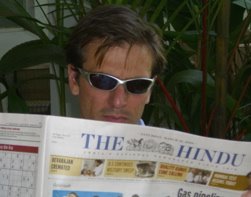
On Dec. 4, BBC News reported that West Bengal's state assembly finalized a bill that bans hand-pulled rickshaws, a plan that's been in the worls for some years.
In the BBC report, West Bengal Chief Minister Buddhadeb Bhattacharya is quoted as saying "Westerners try to associate beggars and these rickshaws with the Calcutta landscape, but this is not what Calcutta stands for. Our city stands for prosperity and development."
According to the mayor of Kolkata, Bikash Ranjan Bhattacharya, "This inhuman mode of transport should have stopped years ago ... We can't imagine one man sweating and straining to pull another man."
I raise this issue not to argue whether such a ban is wrong or right. Certainly one would hope, perhaps naively, that officials are true to their word when they promise that a rehabilitation package for rickshaw pullers who will be out of work is forthcoming. Yet even if a rehabilitation package materializes, it will only be made available to licensed rickshaw pullers, according to the chief minister.
Instead, I raise this issue because I am interested in the rhetoric employed to justify the ban. Bhattacharya claims that Calcutta stands for "development." By extension, then, he must be implying that rickshaw pulling is a sign of underdevelopment. Does he, perhaps, also mean to suggest that rickshaw pulling is uncivilized? If so, is rickshaw pulling uncivilized because it is inhumane (the word the mayor used to describe rickshaw pulling)?
Or is it uncivilized because it is premised on simple machines--the wheel and lever--as opposed to the advanced machines (e.g., autos, streetcars, subways) of developed societies? In other words, isn't this ban really about changing the world's image of Calcutta? Perhaps this is no different than the motivations for New Delhi's subway?
I understand the argument to ban rickshaw pullers on humanitarian grounds. I have seen Calcutta's rickshaw pullers. I have ridden in a rickshaw behind a barefoot puller treading asphalt streets that must have been 55º C. I believe there must be a healthier and safer way for these men to make a living. But I object to officials using the rhetoric of concern for humanity when, or if, their motives truly lie elsewhere.

Since I quoted at length from Yunus' Nobel Prize acceptance speech in my post yesterday, let me conclude with another excerpt from his speech:
I support globalization and believe it can bring more benefits to the poor than its alternative. But it must be the right kind of globalization. To me, globalization is like a hundred-lane highway criss-crossing the world. If it is a free-for-all highway, its lanes will be taken over by the giant trucks from powerful economies. Bangladeshi rickshaw will be thrown off the highway. In order to have a win-win globalization we must have traffic rules, traffic police, and traffic authority for this global highway. Rule of "strongest takes it all" must be replaced by rules that ensure that the poorest have a place and piece of the action, without being elbowed out by the strong. Globalization must not become financial imperialism.I wonder, are Calcutta's rickshaw pullers being thrown off the globalization highway? Or is something else going on here? And might this be an opportunity for one of the "social businesses" Yunus promoted in his speech; a business that could provide rickshaw pullers with a basic guaranteed income and better working conditions?
In case readers are interested in seeing what other bloggers are saying about this issue, check out Indra's Drishtikona, Pareltank, or Isaac Schrödinger.
Technorati tags: microfinance, Kolkata, globalization, rickshaw


No comments:
Post a Comment